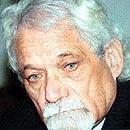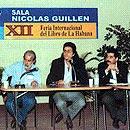Cuban Books Up on a Pedestal
The term “slight recovery” applied to Cuban books is now lagging behind. And it's languishing not only as a result of the increasing number of publishing houses across the island and the existence of luring and well-planned literary contests –like the Alejo Carpentier and Nicolas Guillen Awards- but also due to the ever-growing relevance of Havana's international book fairs since the year 2000's edition. Today, the fair is a major event that packs quite a wallop on the island nation.
This time around, the fair was for the first time ever devoted to a particular author: poet, storyteller, literary critic and essayist Cintio Vitier, winner of the National Literary Award back in 1988. Significance was taken up one notch higher during last year's book fair as the event spread –under a proposal made by Cuban president Fidel Castro- to eighteen Cuban cities other than the capital.
After stretching out from Jan. 30 to Feb. 9 in the main hosting grounds of San Carlos de la Cabana, the event made it in a piecemeal fashion to Pinar del Rio, Consolacion del Sur, San Antonio de los Baños, San Jose de las Lajas, Artemisa, Matanzas, Cardenas and Nueva Gerona. Then it moved on to Cienfuegos, Cumanayagua, Santa Clara, Sagua la Grande, Sancti Spiritus, Trinidad, Ciego de Avila, Moron, Camagüey, Nuevitas, Florida, Las Tunas, Puerto Padre, Holguin, Moa, Bayamo, Manzanillo, Guantanamo, Baracoa, Palma Soriano and Santiago de Cuba, host city of the closing ceremony last March 2.
The increase in both the number of cities and titles put out by Cuban publishers –somewhere in the neighborhood of 900 books- plus sales that peaked 5 million copies in all, this edition of the fair paid tribute to Jose Marti's pharse Reading Is Growth.
This 12th Book Fair featured over forty expositors with Spain and Mexico leading the pack as far as reserved stand space was concerned. Artistic samplings were dominated by exhibits on Cuzco and Colombian writer Gabriel Garcia Marquez, the works of Ecuadorian painter Oswaldo Guayasamin and the books of Andean writers. Another worthy note was provided by the so-called Concerts for the Books and the performance of top-rated entertainers and musical acts.
As to the literary schedule, the event's main course included the presentation of the National Literary Award (Lisandro Otero) and Social Sciences (Zoila Lapique), both from last year's edition; the 2003 Alejo Carpentier Awards in the categories of novel (GuillermoVidal Ortiz), story (David Mitrani) and essay (Duanel Diaz), as well as the Nicolas Guilen Poetry Awards (Teresa Melo) and the Nosside Caribe Poetry Award (Liudmila Quincoses).
World-class Cuban writers attended the fair, most of them ready to present new books of their own. Some outstanding names were Cintio Vitier, Roberto Fernandez Retamar, Fina Garcia-Marruz, Carilda Oliver Labra, Angel Augier, Miguel Barnet, Cesar Lopez, Francisco de Oraa, Nancy Morejon, Anton Arrufat, Lisandro Otero and, last but not least, Pablo Armando Fernandez, who stole the limelight as the event's centerpiece and was honored in his 72nd birthday.
Some of the major literary figures from overseas who came to the fair were William Kennedy, Stonor Saunders, Jorge Enrique Adoum, Justo Jorge Padron, Luis Britto Garcia, Miguel Bonassa and William Ospina.
Like in past editions –yet this time up with renovated energies and strengths- Havana's 12th International Book Fair showed off the importance of Cuban titles and their privileged position in the island nation's cultural realm.


































































